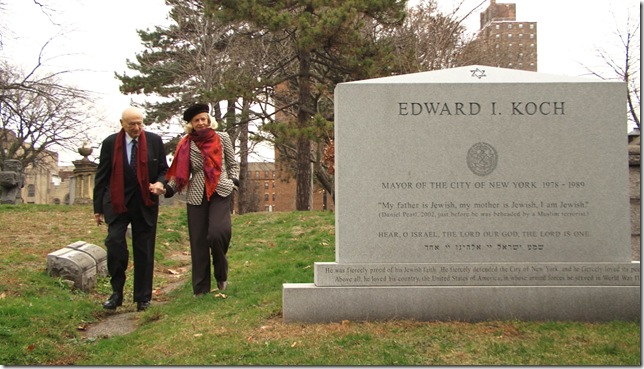In a scene in the new documentary Koch, the titular former mayor sits with some companions in a half-circle restaurant booth, sharing a story that took place in a limousine with Ronald Reagan.
The caravan passed countless adoring fans — along with one loner who decided to assess the president’s performance with a middle-finger salute. Koch says Reagan saw past all the cheers, focusing only on the criticism.
It’s hard to imagine Koch himself responding any differently. If there’s just one take-away from Neil Barsky’s entertaining and studious documentary, it’s that the mayor wanted to be loved by everyone – that he was consumed with a need for his work to be appreciated. It’s a tendency that comes across, in the film, as both conscientious and insecure.
The mayor’s favorite catchphrase, “How’m I doing,” sounds endearing but also needy, a too-frequent request for a performance review. He couldn’t even resist micromanaging his post-mortem, arranging his gravesite and writing his epitaph, which he visits toward the end of the movie.
That Koch’s need to be admired appears as both a positive and negative attribute is appropriate for a figure whose complexity the movie so astutely channels. He really was two things at once – a kind-hearted man desperate for approval who could also be cold and calculating, and prickly and defensive when his motives were questioned. His pro-business, tax-cutting outlook and questionable handling of racial politics made him a liberal pariah, while his strong advocacy for gay rights and the woman’s right to choose riled Republicans.
Koch must have done something right to be re-elected twice, despite angering one constituency after another. Recalling his controversial closing of Harlem’s all-black Sydenham Hospital in 1980, one of Barsky’s interviewees says, “He’s worse than a racist. He’s an opportunist.” And there’s no way to soften the venom that oozes from an African-American New York assemblyman at the proposal that the Queensboro Bridge be named in Koch’s honor (it since has been).
What’s great about this documentary is that Koch’s supporters as well as his detractors can walk away from it with equal ammunition. Barsky is no hagiographer, and he doesn’t give Koch a pass — while applauding advances that Koch proposed, from successfully ending a transit strike to investing in the city’s housing to making the first strides to clean up debauched Times Square. (Rudy Guiliani took all the credit for the latter, of course, and Barsky’s film helps clarify the truth).
If Barsky is doing his job, you’ll love Koch one minute and hate him the next. As the doc shows, he has an amazing ability to communicate directly to people, to speak to them as a fellow New Yorker and not as a politician. After watching the film, Guiliani and Michael Bloomberg look even more like unctuous empty suits. And yet, his refusal to divulge his rumored homosexuality, which he kept secret until the day he died, comes off as a frustrating missed opportunity to use his position of power to inspire gays to come out of the closet.
At any rate, his unpredictability is something to be cherished. How often does any political leader reach across the aisle, let alone vote across it, as much as Koch did? Even his own movie reviews, which he recorded as videos for the Huffington Post toward the end of his life, ran against the establishment grain — he hated Avatar and The Tree of Life and supported Burlesque and It’s Complicated.
In one of those uncanny coincidences that often accompany celebrity deaths, Koch passed away from congestive heart failure the very day this documentary opened in New York. We could try and guess what he would say about it, but we’d probably be wrong.
KOCH. Director: Neil Barsky; Distributor: Zeitgeist; not rated; opens Friday at Movies of Delray, Regal Delray Beach 18, Living Room Theaters at FAU, Regal Shadowood 16, Mos Art Theatre in Lake Park, Cinema Paradiso in Fort Lauderdale and O Cinema in Miami.
